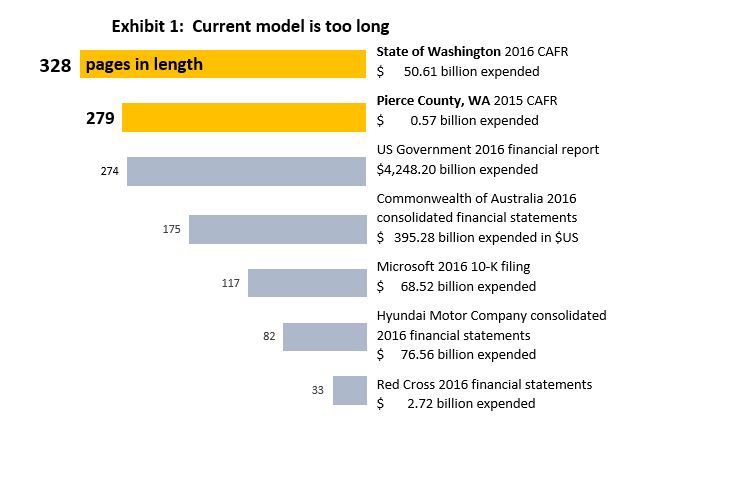Auditor McCarthy: Financial reporting should be easy to read and understand
Apr 19, 2017
Since the original issuance of Governmental Accounting Standards Board (GASB) Statement 34 in 1999, the Office of the Washington State Auditor has found the resulting financial statement presentations to be unnecessarily complex, less timely and more costly for state and local governments to prepare and have audited. These presentations are also more challenging to understand.
Financial statements prepared by state and local government entities in the United States are longer than those prepared by other organizations in the United States and around the world, due to the use of different accounting methods (e.g. modified-accrual and full-accrual) within the presentation.

As a result, in 2007, the Washington State Auditor eliminated thresholds requiring certain local governments to prepare financial statements under this reporting model, allowing the choice of a cash-basis alternative based on the individual needs of each local government. Our Office remains committed to that option for those local governments.
The GASB recently issued an invitation to comment on options for improvements to the financial reporting model over governmental funds. Each option could have appeal, depending on the reader's point of view and use of the resulting information. Therefore, responses to the GASB were many and varied, with some asking for no change at all.
Washington State Auditor Pat McCarthy's response to the GASB took a big-picture view. She used this opportunity to urge simplification – not only of financial reporting for governmental funds, but the entire reporting model, as well. Her support of the full-accrual reporting option for governmental funds noted that:
- All statements would be presented on the same basis, and as a result, eliminating the need for reconciliations and making financial statements more understandable.
- State and local governments already calculate these amounts for their government-wide statements.
- Some of the detailed information could be combined, eliminated or moved to supplementary information.
Because she understands that state and local governments use information from the existing reporting model for developing budgets and demonstrating fiscal accountability to the public, Auditor McCarthy further advocated for consistency in the way that information is calculated and presented.
The response to the GASB also contained other suggestions that could make reporting less burdensome for state and local governments and make statements more understandable. While any change to the reporting model would take time and effort to implement, the long-term benefits of increased efficiency, timeliness and usefulness offset the short-term costs. Auditor McCarthy urged the GASB to consider both the cost and benefits of any changes to the entire financial reporting model, and give priority to those that make reporting less complex and easier to understand.
